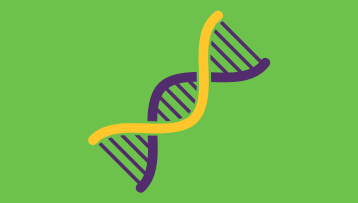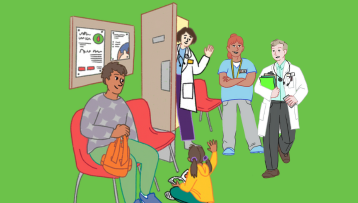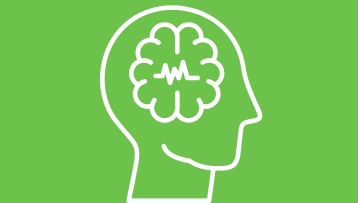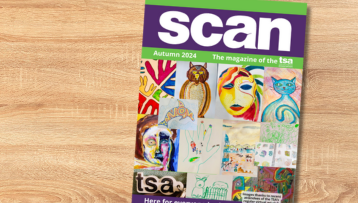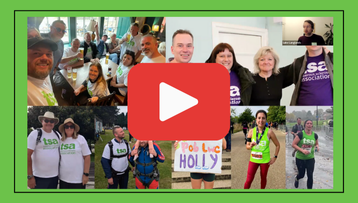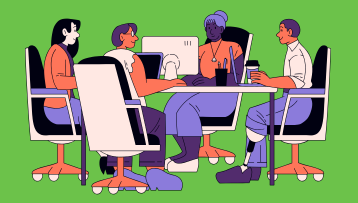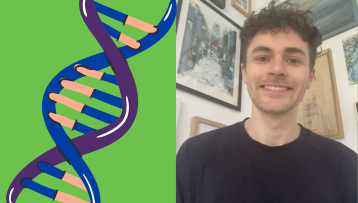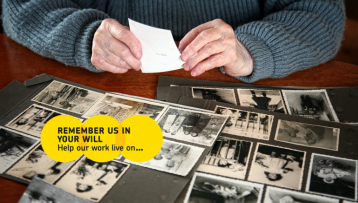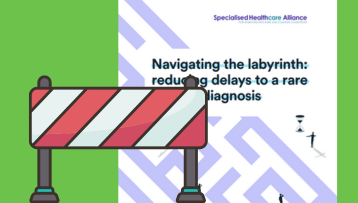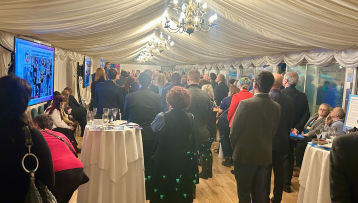New TSC research is looking at whether a type of talking therapy (called ‘Acceptance and Commitment Therapy’ or ‘ACT’) can improve the wellbeing of young people who live with TSC. The experts leading the research, which is part-funded by the TSA, are looking for people to get involved.
ACT aims to help people build rich and meaningful lives, despite challenges and ongoing difficulties. The research is open to young people aged 11-24, with the entire study taking place remotely (meaning that there will be no in-person clinic visits).
To help people better understand the study (called ‘ACT in TSC’), Dr Jennifer Black (Clinical Psychologist and ACT in TSC coordinator) has written the below summary about the study and what people can expect. Dr Black also recently spoke at a TSC event:
What is Acceptance and Commitment Therapy?
Acceptance and Commitment Therapy (ACT) is a psychological intervention that incorporates aspects of other well-known therapies, such as cognitive behaviour therapy (CBT) and mindfulness. ACT aims to help people build a rich and meaningful life, despite challenges and ongoing difficulties, by encouraging increased psychological flexibility. Psychological flexibility is described as being open and in contact with the present moment, and engaging in behaviours that are consistent with an individual’s life goals.
An important factor of ACT is that instead of avoiding painful experiences, it encourages a person to engage with these experiences, allowing them to move towards acceptance. This factor is particularly important when using this therapy to help people living with TSC, as they might be living with unavoidable physical and mental limitations as a result of the condition or the treatment for it.
At Bristol Children’s Hospital, we are trialling an exciting new application of psychological therapy to help children and young adults with TSC. The research team aims to assess the feasibility and acceptability of ACT to help young people, aged 11-24 years, who have a diagnosis of TSC. The team will gather information about quality of life from the participants using both questionnaires and interviews. Then, the team will analyse their results to see how young people, clinicians and others involved found ACT as a therapy. They’ll also see if it was cost-effective.
Why is ACT important?
Research has shown the cognitive and psychological symptoms associated with TSC and their impact on the quality of life of children and young people diagnosed with the condition. Previous articles have highlighted the need to explore means of supporting young people diagnosed with TSC. So far, however, no unique treatments for common mental health problems for individuals with TSC are available. The research team aims to address this unmet need and provide young people with tools that will help them to gain the support they need and have a better quality of life.
Who is the ACT in TSC research for?
This research has the potential to help improve the quality of life of children and young people living with TSC in the UK, aged 11 – 24 years. It will help to improve our knowledge about the types of psychological interventions that are effective for young people living with TSC, and the benefits of psychological therapy for this age group.
About the ACT in TSC team
Dr Sam Amin is Chief Investigator on the trial. Sam is a Consultant Paediatric Neurologist at Bristol Children’s Hospital. He is also a senior research fellow in the Faculty of Medicine and Dentistry at University of Bristol. His clinical and research interests are focused on TSC and CDKL5 Deficiency Disorder. He is the scientific advisor for the TSA and CDKL5UK. Dr Amin has led several national and international studies in this field.
Dr Alexander Marsh and Dr Jess Broughton are both Clinical Psychologists and will be delivering the intervention on the trial. They have experience of working in paediatric neuropsychology and have recently completed their ACT training. They are excited to support young people with TSC.
Dr Jennifer Black is a Clinical Psychologist and Trial Co-ordinator for the ACT in TSC trial. Jennifer has clinical and research experience in paediatric neuropsychology. Jennifer’s work has provided insight into the challenges of living with long-term conditions and navigating the academic and social world that young people grow up in today. This has inspired her to help young people living with TSC.
Dr Ingram Wright is a Consultant Paediatric Neuropsychologist with over 20 years’ experience working with children and young adults with neurological conditions. He has particular interest in the psychological aspects of living with neurological conditions and how we can develop services to offer better support.
ACT in TSC: Taking place remotely
Within the context of the COVID-19 crisis, there have been calls for mental healthcare to be enhanced for vulnerable groups, such as young people with TSC, specifically including the use of remotely delivered mental health treatment. Further, given the availability of psychological therapies for TSC, young people may need to travel long journeys in order to access specialist support. The trial at University Hospitals Bristol will be delivered remotely, via video-conferencing, and will involve weekly meetings online for up to 12 weeks. This means young people won’t have to travel to get to the hospital to receive the treatment.
Learn more about ACT in TSC
We are recruiting into the study now. If you are aged between 11 and 24 with a diagnosis of TSC and are interested in taking part in the study, please contact us on the details below. If you are under 16 we will need your parent’s consent for you to take part.
- Department of Paediatric Neuropsychology: Paediatric.Neuropsy@uhbw.nhs.uk; 0117 342 8168
- Dr Jennifer Black, Trial Co-ordinator: Jennifer.Black@uhbw.nhs.uk
- Dr Sam Amin, Chief Investigator: Sam.Amin@uhbw.nhs.uk
Make a one off or regular donation
£10 Can allow us to send a welcome pack to a family who has just received a life-changing TSC diagnosis, ensuring that they do not go through this time alone.
£25 Can help us develop materials that are included in our support services, flagship events or campaigns.
£50 Can provide laboratory equipment for a day’s research into the causes, symptoms, management or treatment of TSC.
To provide help for today and a cure for tomorrow













